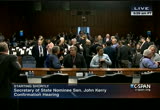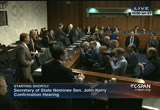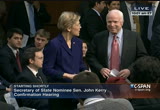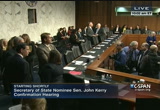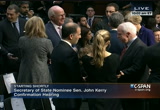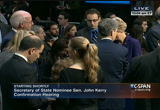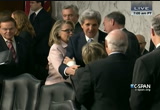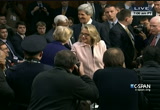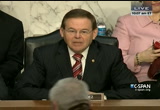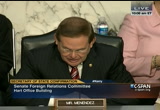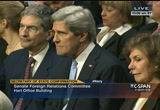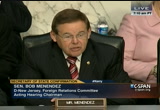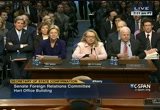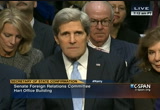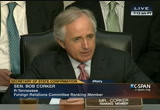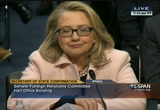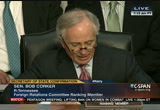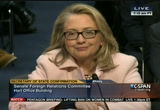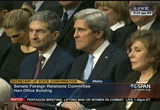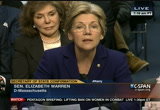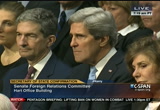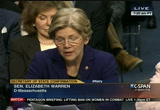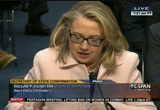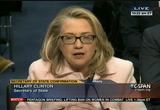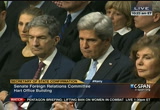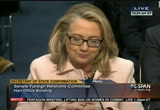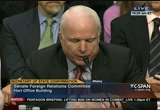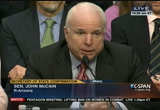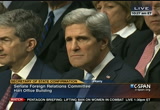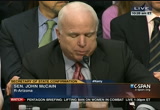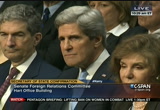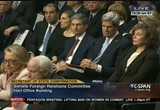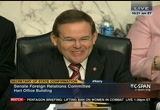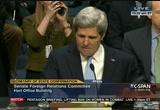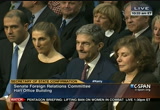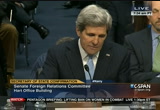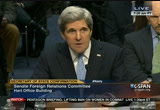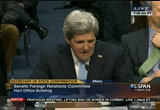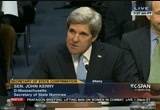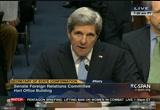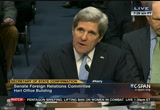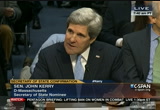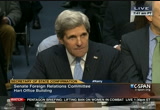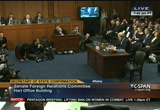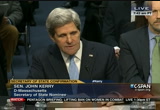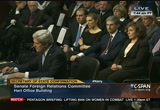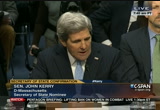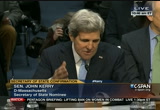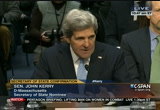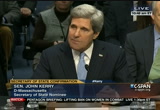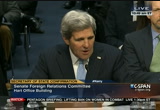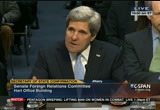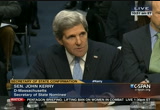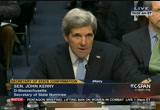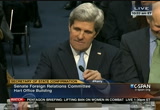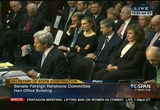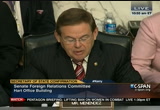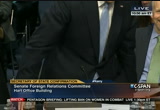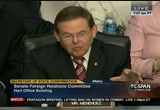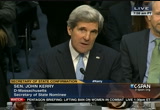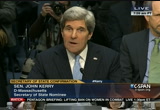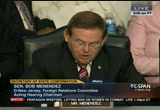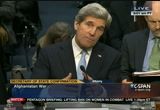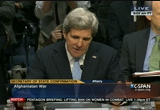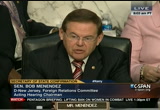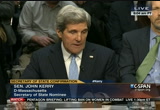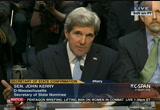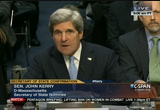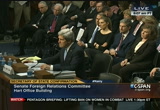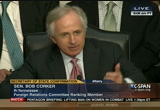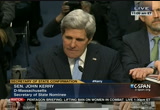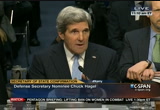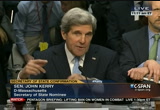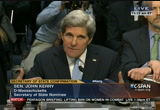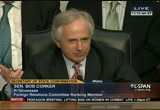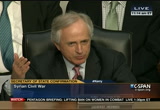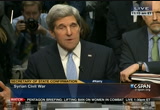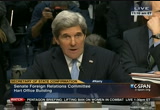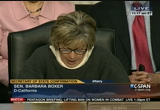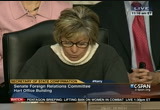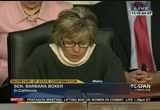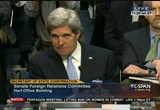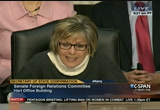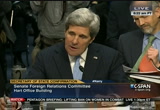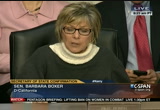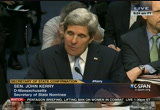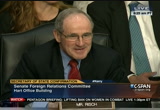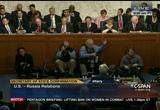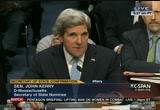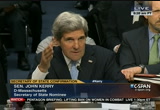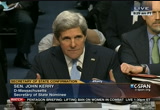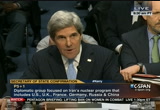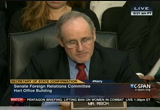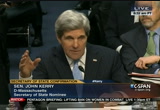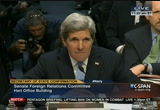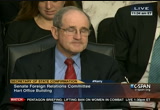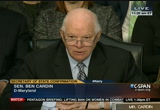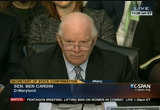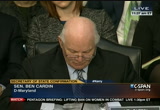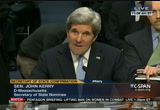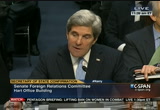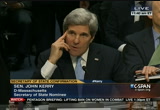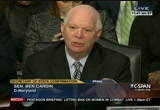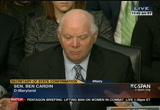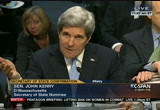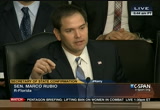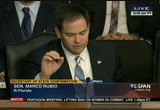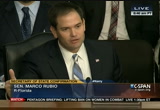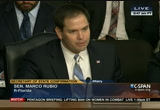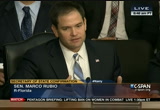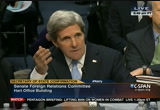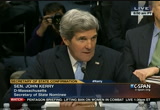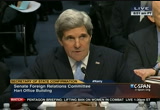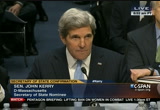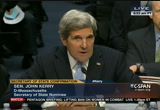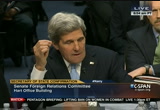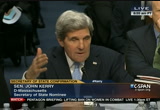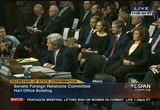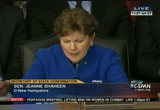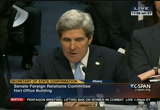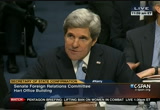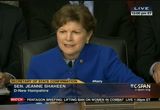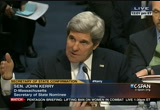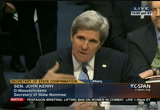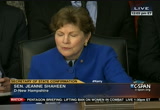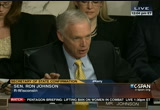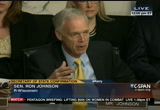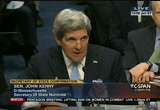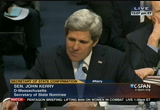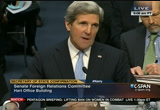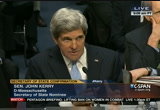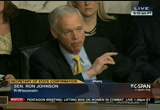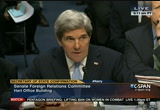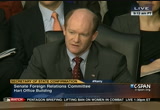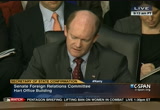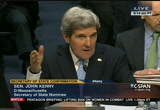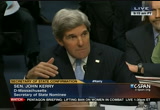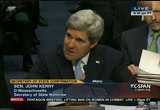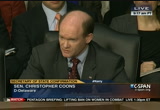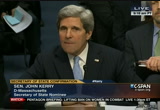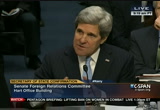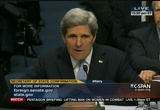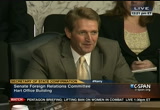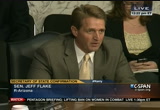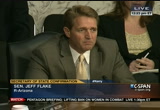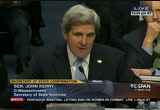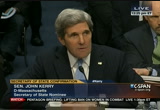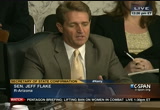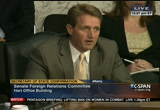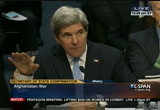tv Secretary of State Nomination CSPAN January 24, 2013 10:00am-12:30pm EST
10:01 am
>> second day at the senate foreign relations committee here on c-span. live coverage on your left is senator warren from massachusetts. senator john mccain, of course, who will introduce senator john a. boehner. also, they're -- senator john kerry. also they're waiting for hillary clinton, john kerry to be the next secretary of state. secretary clinton wrapping up 5
10:02 am
10:03 am
10:04 am
10:08 am
consider the next -- the nominee for the secretary of state will come to order. let me, again, ask as i did yesterday, since the full senate has not yet passed the committee resolution sitting members, i ask unanimous consent the returning members to allow our prospective members to participate in today's hearing and if there is no objection, so ordered. let me start with saying you're not at the table yet, senator, but we're going to have you there shortly. wow. what a high priced staff member. let me say, senator kerry -- or should i say, mr. chairman, since you are still our committee's chair, that deeply humbled to preside over the committee today as we consider your nomination. we're honored to welcome you as the president's nominee for a position you have most deservedly earned.
10:09 am
from the first time you testified before chairman full bright as a young returning vietnam war hero in 1971 to the day the president nominated and announced your nomination as secretary of state. you may not be aware of it, but you will be the first member of this panel to ascend directly to the position since senator john sherman of ohio became senator mckinley's secretary of state more than 100 years ago. so you are clearly making history once again. yours is a big chair to fill, and i will do my best today to live up to your example. i've watched your lead on the committee with an equally deep and abiding commitment to get to the heart of the matter. always probeative, always ready for debate, always looking for the truth to answers, uncovering the facts, hearing all the evidence and then publicly speaking truth to power based solely on what was the best interest of the nation. as a senator, as a member of
10:10 am
this committee and as chairman, you have already built strong relationships with leaders around the world which will help you seamlessly into the role of secretary of state. you will need no introduction to the world's political and military leaders and will begin on day one fully conversed not only with the infrom a cassies of u.s. policy but with the understanding of the nuance approach to necessarily interact on the multinational stage. when vice president biden sat on this chair, he said on more than one occasion, good international relationships are always predicated on strong interpersonal reproliferationships. i think we can all agree that you have set the highest standard for developing those relationships throughout your career, and as secretary of state, you will continue to strengthen those relationships on behalf of the president and the furtherance of american foreign policy. i'll have some questions later on policies and your views,
10:11 am
including how you explain to world leaders how you could have been rooting for the boston red sox instead of what the world knows as the new york yankees as the team of the world, but let me say, mr. chairman, it's been a pleasure working with you and looking forward to continuing to work with you in the issues you've championed over the years. fighting global terrorism, preventing the spread of nuclear biological, chemical weapons, fighting for human rights and against hiv-aids around the world, fighting crime, corruption, drug trafficking and standing up, as you always have, for the interest of the foreign service around the world. in your role, should you will be confirmed, and i know you will, your portfolio will be greatly expanded, you will represent the interests of all of us, from securing our embassies and protecting our overseas personnel to promoting commerce, enhancing cross-cultural ties and keeping america secure through cooperation, where possible, and isolation where necessary as in the case of iran. and of course it goes without
10:12 am
saying that you have truly been a world leader on one of the most consequential issues of our time -- climate change, and it heartens me to know that someone with your commitment to the issue will be our voice to the world. the fact is whatever the challenges we will face in my view, the state department could not be in better hands. when it comes to america's role in world affairs, i know we agree that it is critical that the united states remain fully engaged, that we project not only the power of our military strength when necessary but the wisdom of our democratic ideals as we adjust to the new threats and new demands we will inevitably face. there is no doubt you will be tested in your new role as secretary, nor is there any doubt that you will pass any tests with honors as you always have. before i recognize senator corker, let me thank you on behalf of the committee for all you have done through your long and illustrious career here in the senate and in the chairman ship of this committee and in
10:13 am
anticipation of your confirmation by the full senate, i wish you good luck and god speed to many of the journeys that lie ahead and we look forward to having a close working relationship with you as the next secretary of state. let me now recognize senator corker, the ranking member, for his comments. >> well, thank you, mr. chairman. i thank our three distinguished guests who are going to introduce the chairman in just a minute. i want to say to the chairman, i want to thank you for your courtesy over the last six years as i've served on this committee. i look at you at being nominated for this as someone who's almost lived their entire life, if you will, for this moment of being able to serve in this capacity. there's no run in the united states senate that has spent more time than you have on issues of importance to our country. the experience you developed while being on this committee and spending time abroad with world leaders with your wife, who's at your side today,
10:14 am
there's almost no one that spent that kind of time and effort. so i'm happy for you. i know the many conversations we've had over the last two weeks, you're very anxious to serve. you're ready to go. my sense is your confirmation will go through very, very quickly. i do look forward to your testimony today. secretary clinton's here today, after a day of hearings both here and in the house, and i think you know you're inheriting a department that like many departments throughout government has numbers of challenges. we saw systemic issues that need to be addressed and they're in the process of being addressed right now. our nation has budgetary constraints which means that in all of these departments creativity is going to have to be utilized to make sure we make the most of what we have in making sure that our u.s. interests are put forth. we have a world that is a dangerous world, and things
10:15 am
continue to come over the area. sometimes at surprising times. i know as secretary of state, you are going to have to lead our country in addressing those as they come about. i do hope that you'll work closely with this committee, as you've work very closely with this committee over the last many years, in helping us work with you to make sure that as we move ahead we move ahead together and that it's seamless. we have many challenges, and i know on monday president obama said that america will remain the anchor of strong challenges in every corner of the globe. we will renew those institutions that extend our capacity to manage crises abroad for no one has a greater stake in a peaceful world than its most powerful nation. i could not agree more. i look forward to again hearing your testimony today about what you hope to do in your new
10:16 am
capacity, and i certainly welcome the three distinguished people who are here today to introduce you, which i know is a tremendous honor for you. thank you for your service. i look forward to your testimony. >> thank you, senator. we have a star-studded panel here to introduce the nominee. starting with -- i'll introduce you in order of your presentation, but i just want to start off by welcoming back the secretary, again, and we appreciate you coming back to us so soon and, again, you know, thanks from the committee and a grateful nation for your service to our country. and my understanding, although i'm being told differently, are you going -- senator warren -- senator warren, who is our new colleague, from the great state of massachusetts is going to be
10:17 am
part of introducing her senior senator before the committee. then, secretary clinton, and our distinguished colleague, a member of this committee now as well, senator mccain. with that, senator warren. >> thank you. thank you, senator menendez. it's an honor to be here with secretary clinton and senator mccain to introduce my senior senator and my friend, senator john kerry. i have the privilege speaking for a man i know will continue in the tradition of john quincy adams and christian herder as great secretaries from the commonwealth of massachusetts. although john learned much about diplomacy overseas and in the senate, he would be the first to tell you that massachusetts is also a great teacher of diplomatic skills, whether it was negotiating his way to make the ballot as long shotgunned dog in a five-way heavily contested state convention back in 1982, or the
10:18 am
way he brought labor and management to the table, locked the parties in his senate office over a long weekend, brought in duncan doughnuts and negotiated an end to the 92-day long brockton nurses strike. if anyone wants to learn diplomacy, come to our massachusetts politics. john's story is well-known to all of us, as a youth of a son of a young foreign officer and learning about foreign policy at the dinner table each night to his service in combat in vietnam. less well-known is the story of his foreign policy work inside the senate. his 90 overseas trips that he made in 28 years on the foreign relations committee, his work with dick lugar to ensure free elections in the philippines, his work with bill frist on aids in africa, his work as
10:19 am
chairman of the new start treaty and his very public and successful diplomatic interventions in afghanistan, pakistan and sudan. i think one day historians will judge his senate years in temperatures terms of his impact on foreign policy much the same way so many recognize senator ted kennedy's impact on domestic policy. from his many years in the u.s. senate, john has developed a very personal understanding that we represent not just states or government but also people. i once asked john why he loves the senate. he said, it's the pride he feels in trying to get things done for people. for three years now, he's been working quietly to help a father from newton, massachusetts, colin bauer, whose two sons were kidnapped and taken to egypt.
10:20 am
john even called former president mubarak and had a screaming match with him about it. five times he's been to egypt since then and every time colin has been at the top of his list in every meeting. every senator here has a colin bauer. it's what we do. we fight for people back home. as secretary, john will understand that and bend over backwards to help us do that. he will be a terrific bridge from the hill to the administration. i know that john cares deeply about our country and our national security. i know he believes through and through in the good that america can do in the world because he's seen it and he's lived it all his life. from seeing the marshal plan in action with his father in post-world war ii europe, to volunteering to serve in the military and in traveling all these years as a senator.
10:21 am
john says, america isn't exceptional because we say we are. we're exceptional because we do exceptional things. when the airplane, the one that says on the side, united states of america, lands anywhere in the world, i will be proud that it will be john kerry representing us. thank you. >> thank you, senator. secretary clinton. >> thank you, mr. chairman. it's very good to be back and to have this opportunity to join with senator warren and senator mccain in introducing president obama's nominee to be the next secretary of state. i was very honored when john asked me to take part in this because john is the right choice to carry forward the obama administration's foreign policy, and i urge his speedy confirmation. as we've heard from both the chairman and the ranking member and just now senator warren, he will bring a record of
10:22 am
leadership and service that is exemplary. he has a view of the world that he has acted on. first as that young returning veteran from vietnam who appeared before this committee, through the times that he served with such distinction as chairman. he's been a valued partner to this administration and to me personally. he has fought for our diplomats and development experts. he understands the value of investing in america's global leadership, and as we work to implement the accountability review board's recommendations, he's committed to doing whatever it takes to prevent another attack and protect our people and posts around the world. now, working together, we've achieved a great deal, but the state department and usaid have a lot of unfinished business
10:23 am
from afghanistan to nonproliferation to climate change to so much. we need to sustain our engagement in the asia pacific, continue ramping up economics as a tool to advancing america's interests and jobs, unleashing the potential's women and girls, keep championing the kind of smart power that looks to innovation and partnerships with governments and people alike to promote peace and stability. john has built strong relationships with leaders in governments here and around the world, and he has experience in representing our country in fragile and unpredictable circumstances. he was in pakistan and afghanistan a few years ago, and we were consulting over the phone. he played an instrumental role in working with president karzai, at the time, to accept the results of the election and to move forward. i had to call harry reid and
10:24 am
ask harry not to schedule any votes so that john could continue to stay there to see that mission through. but that's what he does. he is a determined and effective representative of the united states. has been as senator and will be as secretary. let me close by saying that leading our diplomats and development experts is a great honor, and every day as i testified yesterday, i've seen firsthand their skill, their bravery, their unwavering commitment to our country. i've been proud to call them colleagues and serving as secretary of state. i know that john will continue the work of a lifetime on behalf of our country. thank you. >> thank you, madam secretary. senator mccain. >> thank you, mr. chairman. i'm pleased to be here with senator warren and secretary clinton to introduce and speak -- say a few words about my friend, senator kerry, to the
10:25 am
committee. obviously the nominee doesn't need to be introduced to the committee on which he's served for over a quarter of a century. as the chairman for the last four years. so i can dispensed with the customary summary of his public service and qualifications for the office for which he's been nominated. they're well-known to you and to all of our colleagues. but i'd like to take a few moments to attest to the personal qualities that senator kerry would bring to the office of secretary of state, which i think are well suited to the position. he and i have been friends for quite a long time now. we've had our disagreements, which is unsurprising, given our political differences. and as often the case in our business, our friendship has been affected from time to time by our enthusiasm for our differing views and by the competitive nature of politics. but the friendship has endured, i believe, it is based in mutual respect.
10:26 am
some observers have attributed that respect to the fact that when we were much younger, nicer and better looking men than we are now, senator kerry and i spent some time at the navy's behest in a certain southeast asian country in less pleasant circumstances than we're accustomed to in the united states senate. while i've always respected and honored senator kerry's service in vietnam, my respect for john as a senator and my support for his nomination today originated in a very different experience. although that experience, too, concerned the country and the war he and i were privileged to serve in. it did not require marshal valor. on the contrary, it required, at least on senator kerry's part, and considerably less so on mine, extraordinary diplomatic skills. the administrations of president reagan and george herbert walker bush, had
10:27 am
limited engagement with the government of vietnam for the purpose of enqurge couraging vietnam to provide answers of the face of many americans who were still listed as pow-mia. that effort was led by a man both john and i respect, former chairman of the joint chiefs, vecsey, who continued as the president's special apple sear to vietnam in president clinton's administration. by the early 1990's, i think both jaurn and i had come to the view that it would be better for our country to have a relationship with vietnam that served our current and future interests than one that continued to nurse the hostilities of our recent tragic past. but we both understood that could never be the case unless we knew american soldiers were not still kept against their will in vietnam and until vietnam fully cooperated in helping us account for americans who didn't return home from the war. to help find answers to their
10:28 am
fates, in 1991 then senate majority leader mitchell and minority leader dole had a committee that i appointed as well. members of the committee had conflicting views on the subject of whether or not vietnam still kept american p.o.w.'s. the subject was controversial and provoked the strong passions of many americans, not the least of which were the families of the missing. most americans who cared about this issue were people of sincere good will and honesty, but there were also a few sharl tans and con artists who for whatever reasons had conspiracy theories and im plausible scenarios. our public hearings became a circus. behind the scenes, arguments between colleagues became
10:29 am
heated and personal as any i have ever experienced. getting information of pow-mias from the intelligence community was fraught with difficulties and getting information from the vought in a meeze even more so. -- vietnamese. it wasn't a pleasant experience, to say the least. but through it all, john led the committee with fairness to all sides, with persistence in the pursuit of the truth and with an unshakeable resolve that all members could accept. really, no matter how contentious at a time crazy things got, john eventually got the committee to provide an answer that would be accepted by most veterans and most if not all, americans who cared so much about the issue. and he did. he got all the members to agree to an exhaustive investigative report that concluded there was no credible evidence that
10:30 am
americans did not remain in captivity in vietnam. it was a masterful accomplishment. after that experience, john and i worked together to encourage the clinton administration and the government of vietnam to begin normalizing relations. i witnessed john's diplomatic skills and practice again. his patience, his persistence, his persuasiveness, his tact, and his singular focus on getting the best result possible in negotiations with a diverse array of government officials in both countries, convincing a reluctant administration to make what the president's advisors considered a politically perilous decision and reluctant fellow senators to vote for a resolution recommending normalization. it was an impressive performance, to say the least. helping to establish a relationship with vietnam that serves american interests and values rather than one that remained mired in mutual
10:31 am
resentment and bitterness is one of my proudest accomplishments as a senator, and i expect it's one of john's as well. working toward that end with john and witnessing almost daily his exemplary statesmanship is one of the highest privileges i've had here. should he be confirmed, and i'm confident he will be, and become our next secretary of state, i'm sure we will have our disagreements, which i'm sure neither of us will hesitate to bring to the other's attention, but i know he'll quit himself in that office with distinction and use his many talents and his persistence to advance our country's interests. i commend his nomination to you without reservation. >> wow. you might want to rest your case there, mr. chairman. with our thanks to this distinguished panel, we thank you very much, madam secretary. thank you, again, to our colleagues. and now we call up chairman kerry.
10:32 am
10:33 am
much. i'm in awe of the wonderful comments that were just made, and i appreciate them and i'll say a little bit more about them. before i begin, i'd like to have the privilege of just introducing very quickly -- i think most of you know my wonderful wife, teresa, who has been part of this great journey for a long time, my brother, kamm, who is serving over in the commerce department, and i trust they know he's here. my daughter vanessa and her husband, brian, both of whom are working as physicians as mass general in boston. and another daughter, who is not here, alexandra and three step sons who are likewise spread around the world. but we are thinking about them as we embark on this wonderful journey. for 29 years, i've sat up on the dieas where you all are and i looked down at the witnesses and wondered what they're thinking sometimes as we
10:34 am
question them and i don't want this to affect your opening questions. but let me say, i've never seen a more distinguished and better looking group of public officials in my life. suddenly, i am feeling a lot of sympathy for the folks who sit down here. i want you to know that a couple nights ago i was watching "godfather 2" so be forewarned if someone suddenly shows up with my long lost brother back in the audience. all bets are off, folks. and i am enormously grateful for the generous comments of the chair and the ranking member. thank you very, very much. thank you, also, for your tremendous cooperation over the course of the last years in providing that you get me out of here quickly. i will be able to congratulate you more fully when you officially assume your
10:35 am
responsibilities. i will tell you all of you on this committee, the new members, particularly, that i have enjoyed chairing this committee and working with you as much as anything that i have done or been privileged to do in all of my career. i think this is one of the great committees of the united states senate, and it is the only major committee that i have served on since day one when i arrived in the senate in 1985. as you know, the committee carries special consequential responsibilities with respect to the security of our nation, and i think each and every one of you for the serious consideration you give and have given to the challenging issues and for the remarkable cooperation that i have had as chairman of the committee. if confirmed i will be forward to continuing to work
10:36 am
particularly closely with all of you as we tackle some of the toughest issues and challenges that i have seen in the entire time i've served on this committee, and i particularly welcome the new members in that regard. i'm very grateful to president obama for nominating me and entrusting me with this important responsibility, and i am particularly grateful to secretary clinton, senator mccain and senator warren for their introductions of me just now. i will not take it personally that this may be the one item in washington that seems to unite democrats and republicans to get me out of the senate quickly. secretary clinton, particularly, has served above and beyond the call of duty. i think everybody on this committee would agree. her service has been superb and we all thank her for a job well
10:37 am
done, for her tireless efforts on behalf of our nation. she has set a very high mark for the stewardship of the state department and her commitment to country. and i can pledge to you that with the consent of the senate, i will do everything in my power, summon all my energy and focus to build on her record and on the president's vision. senator mccain, as he mentioned, is a longtime friend. we met here in the senate coming from very different political positions and perspectives, but, you know, we found common ground. i will never forget standing with him in hanoai, in the cell which he spent many years of his life listening to him talk about that experience. i will always be grateful for his partnership in helping to make real peace with vietnam by
10:38 am
establishing the most significant process in the history of our country or in any country, for the accounting of missing and dead in any war. and then for working to lift the embargo and ultimately normalize relations with an old enemy. john had every reason to hate, but he didn't and instead we were able to help heal deep wounds and end the war that had divided too many people for much too long. as we talk about war and peace and foreign policy, i want all of us to keep in our minds, as i think we do, the extraordinary men and women in uniform who are on the front lines even as we meet here today, the troops at war who helped protect america. i can pledge to you as a veteran of war, i will always carry the consequences of our decisions in my mind and be
10:39 am
grateful that we have such extraordinary people to back us up. i also thank my new colleague, senator warren, for her generous comments. she's a longtime fierce fighter for what is just and fair. and if her testimony has any affect today and the confirmation -- i spent 29 years. it's humbly to hear before you in this new role as president obama's nominee for secretary of state, but my approach to this role, if confirmed, is also deeply informed by the 28-plus years that i have been privileged to spend in the senate. that perspective will remain with me, if confirmed, as secretary. and i'm already excited by the many ways that we can work together and in which we must
10:40 am
work together. in order to advance america's security interests in a complicated and ever more dangerous world. i would add that i'm particularly aware that in many ways the greatest challenge to america's foreign policy will be in your hands, not mine, because while it's often said that we can't be strong at home if we're not strong in the world, if these days of fiscal crisis and as a recovering member of the supercommittee, i am especially cognizant of the fact that we can't be strong in the world unless we're strong at home. and the first priority of business, which will affect my credibility as a diplomat and our credibility as a nation, as we work to help other countries create order, the first priority will be that america at last puts its own fiscal house in order.
10:41 am
i really can't emphasize to you enough how imperative this is. people all over the world are looking to the united states for leadership. we are known as the indispensible nation for good reason. no nation has more opportunity to advance the cause of democracy, no nation is as committed to the cause of human rights as we are. but to protect our nation and make good on our promises, as well as to live up to our ideals and meet the crisis of this moment, it is urgent that we show people and the rest of the world that we can get our business done in an effectively and timely way. it is difficult enough to solve some of the problems that we face, but i will tell you it becomes impossible or near impossible if we ourselves replace our credibility and leverage with gridlock and dysfunction. i've heard it in my trips and secretary clinton has heard it
10:42 am
in her trips and any of you that travel will begin to hear questions about whether or not the united states can or will deliver. moreover, more than ever, foreign policy is economic policy. the world is competing for resources in global markets. every day that goes by where america is uncertain about engaging in that arena or unwilling to put our best foot forward and win, unwilling to demonstrate our resolve to lead is a day in which we weaken our nation itself. my plea is that we can summon across party lines, without partisan diversions and economic patriotism which recognizes that americans' strength and prospects abroad depend on american strengths and results at home. it's hard to tell the leadership of a number of countries that they have to
10:43 am
deal with the i.m.f., balance their budget, create economic order where there is none if we don't provide it for ourselves. it's also imperative that in implementing president obama's vision for the world as he ends more than decade of war that we join together to augment our message to the world. president obama and every one of us here knows that american foreign policy is not defined by drones and deployments alone. we cannot allow the extraordinary good that we do to save and change lives, to be eclipsed entirely by the role that we have had to play since september 11, a role that was thrust upon us. american foreign policy is also defined by food security, energy security, humanitarian assistance, the fight against disease and the push for
10:44 am
development as much as it is by every single counterterrorism initiative, and it must be. it is defined by leadership, on life-threatening issues like climate change or fighting to lift up millions of lives by promoting freedom and democracy from africa to the americas or speaking out for the prisoners of gulags in north korea or millions of refugees and displaced persons or victims of human trafficking. it is defined by keeping faith with all that our troops have sacrificed to secure for afghanistan. america lives up to her values when we give voice to the voiceless. i share with the president the conviction that is equally imperative that we assert a new role in the world of increasing failed and failing states. burgeoning populations of young people, hungry for jobs,
10:45 am
opportunity, individual rights and freedom are rebeling against years of disenfran cliesment and humiliation -- disenfranchisement and humiliation. the person who started the arab nation wanted to sell his fruit without corruption and abuse. that's what led him to self-immolate. the youth of terrier square represented a generational thrurs for opportunity, not a religious movement. the developed world can do more to meet the challenge and responsibility of these aspirations. with the help of all the members of this committee, i am determined to help president obama meet this moment. it is vital for our nation that we do so. the world is well aware that we face a number of the dangerous
10:46 am
challenges, particularly in the middle east and south central asia. given our extraordinary interests in nonproliferation, we must resolve the questions surrounding iran's nuclear program. the president has made it definitive. we will do what we must do to prevent iran from obtaining a nuclear weapon, and i repeat here today, our policy is not containment. it is prevention and the clock is ticking on our efforts to secure responsible compliance. this administration, working with congress, and an unprecedented international coalition, has put into place crippling sanctions on iran. mr. chairman, you have been a leader in that effort. and i know will continue to be. president obama has stated again and again, and i want to emphasize this. he and i prefer a diplomatic
10:47 am
resolution to this challenge, and i will work to give power lines -- diplomacy every effort to succeed, but no one should mistake our resolve to reduce the nuclear threat. nearly 42 years ago chairman fullbright first gave me the opportunity to testify before this committee during a difficult and divided time for our country. today i can't help but recognize that the world itself then was in approximate many ways simpler -- was in many ways simpler, cold war antagonisms. today's world is more complicated than anything we have experienced. from the emergeans of china, to the arab awakening, inextricably linked, environmental, demographic issues, proliferation, poverty, pandemic disease, refugees, conflict ongoing in
10:48 am
afghanistan, entire populations and faiths struggling with the demands and the accelerating pace of technological innovation invading all of that, shifting power from nation states to individuals. with the end of the cold war, henry kissinger pointed out in his superb book on diplomacy, he said, none of the most important countries which must build a new world order have had any experience with the multistate system that is emerging. never before has a new world order had to be assembled from so many different perceptions or on so global a scale. nor has any previous order had to combine the atributes of the historic balance of power system with global democratic opinion and the exploding technology of the contemporary period. that was written in 1994, and it may be even more relevant
10:49 am
today. so this really is a time for american leadership, a time for fresh thinking, a time to cross party lines and divide and come together in the interests of our nation, a time to find ways to work together to maximize the impact of all of america's resources, including the great resource of this committee and of the united states senate. if i am confirmed, one of the first things i intend to do is sit down with senator menendez and senator corker and invite all the members of this committee to come together, hopefully at a time where there is no interruption and we can actually dig in and talk and talk about how we can have a constructive dialogue and a collegial relationship. because even as we pride ourselves on the separation of powers and the unique oversight role that the committee plays, the challenges in the world are
10:50 am
so enormous that we will do our country a disservice if we didn't identify the ways that we can help each other to confront a unique set of questions globally. if you confirm me, i would take office as secretary proud that the senate is in my blood but equally proud that so too is the foreign service. my father's work under presidents, both democrat and republican, took me and my siblings around the world for personal journey that brought home the sacrifices and the commitment the men and women of the foreign service make every day on behalf of america. i wish everyone in the country could see and understand firsthand the devotion, loyalty , amazingly hard and often dangerous work that the diplomats on the front lines do for our nation.
10:51 am
theirs is a service which earns our country an enormous return on investment. i will be proud and honored to represent them and i will work hard to augment our public diplomacy so that the story is told at home and abroad. everyone on this committee knows well that the road ahead is tough, but i believe just as deeply that global leadership is a strategic imperative for america. it is not a favor that we do for other countries. it amplifies our voice. it extends our reach. it is the key to jobs, the fulcrum of our influence. it matters. it really matters to the daily lives of americans. it matters that we get this moment right for america, and it matters that we get it right for the world. one discussion that i particularly look forward to beginning with you, my colleagues, and with our country is about the commitment that we make in our foreign
10:52 am
affairs budget. less than 1% of the entire budget of government at a time that the world is getting smaller, that our economy depends on its relationship with every other country in the world, that we face a more global market than anytime in our history. so not just in my briefings at the state department but in my conversations with business leaders, in my trips to crisis areas, to war zones, to refugee camps and in some of the poorest countries on earth, i have been reminded of the importance of the work that our state department does to protect and advance america's interests and do the job of diplomacy in a dangerous world and particularly i think there is more that can be done to advance our economic capacity and interests. in this debate and in every endeavor, i pledge to work very closely with this committee, mr. chairman and mr. ranking member, not just because it
10:53 am
will be my responsibility but because i will not be able to do this job effectively nor will our country get what it needs to out of these initiatives without your involvement and your ideas going forward. so thank you, mr. chairman, and members of the committee. i know there's a lot of ground to cover. >> the committee will be in order. the committee will be in order. >> i'm tired. [inaudible] [laughter] >> well, you know, i tell you, mr. chairman, when i first came to washington and testified, i obviously was testifying as part of a group of people who came here to have their voices heard. and that is above all what this place is about.
10:54 am
so i respect i think the woman who was voicing her concerns about that part of the world and maybe -- senator mccain, you were just there. you were in a refugee camp but i know you heard this kind of thing. people measure what we do. in a way that's a good exclamation point to my testimony. so mr. chairman, i know there's a lot of ground to cover, and as a veteran of the committee, i know we do better when we have a good dialogue so i look forward to having that dialogue. thank you. >> thank you, mr. chairman, for your very thoughtful presentation. on behalf of the committee, we welcome teresa and all of the family and we thank you for your commitment as well, because obviously it is a commitment of family as well to the service that senator kerry will provide as secretary of state and there are sacrifices in that so we appreciate it very much. let me start off with a round of questioning. the chair will recognize himself. and let me say that we -- i think we all appreciate and
10:55 am
embrace your offer of engagement in the committee. we look forward to that and having come from the senate, i know that we will particularly appreciate your understanding of this institution and its importance of the committee so we really embrace that offer and look forward to that moment. let me start off with iran. in the last 13 months, congress has passed and the president signed three major sets of sanctions against iran. they have been tremendously effective in reducing iran's oil revenues and at least nominally bringing iran to a negotiating table. however, iran remains defiant and ambitious in its nuclear ambition. it has not slowed its enrichment. the iaea believe they have conducted live test of conventional explosives at a
10:56 am
military base to which it denies iaea entry. between may and august of this year, iran has more than doubled the number of centrifugesality its -- centrifuges at its facility which is buried deep in a mountain. iran needs -- a country with peaceful ambitions doesn't enrich uranium at defines of u.n. security council resolutions. it doesn't fail to hide them inside a mountain. and a peaceful nation doesn't breach the international inspections regime compelled by the nuclear nonproliferation treaty. so, mr. secretary, in this respect, senator -- [laughter] >> i thought this could be quick. >> i have a sense of claire voyans. in this -- clairvoyance. in this respect, many of the sanctions are overseen by the
10:57 am
department of state in terms of enforcement, and its crucial that that enforcement can bring a verifiable agreement, hopefully with iran. under your leadership, will the department be committed to the full enforcement of the sanctions passed by the congress and to multilateral efforts to ensure the adherence of other nations to these sanctions? >> yes. totally. i might just quickly add. the real has dropped by about 80%. other nations have been extraordinarily cooperative in reducing their dependence on iranian oil. there is a clear indicator the impact these are having. i think the congress deserves credit to put toughest sanctions in history. >> in that respect, as we hope while the president set all options on the table, we hope that the sanctions which will ultimately drive us to a successful conclusion. what would be the basic parameters in the p-5 plus one effort in terms of enrichment
10:58 am
capacity, enriched ukrainement, the fordo facility, what will you seek as part of any agreement? >> well, we'd seek compliance with the requirements of the iaea and the requirements of the u.n. resolutions that have been passed with respect to it and compliance with the n.p.t. itself. i'm not going to be totally inappropriate for me here to begin to negotiate with myself and the committee with respect to how they would come into compliance or what would be required. i can tell you this -- it is going to be imperative that they come into full compliance, and there are several ways in which we might be able to get there and most prominently, obviously, the opinion h 5 plus one but the president has made it clear that he's prepared to engage if that's what it takes in bilateral efforts and hopefully there's a negotiation going on right now for the next meeting of the p-5 plus one.
10:59 am
i think everybody is very hopeful that we can make some progress on the dip loy matic front now. -- diplomatic front now. so i simply say, mr. chairman, in a iran continue -- i'd say this to the iranians. i hope they listen. they've continually professed the peacefulness of their program. it is not hard to prove a peaceful program. other nations have done that and do it every day, and it takes intrusive inspections. it takes living up to publicly arrived at standards. everybody understands what they are. the allies in the p-5 plus one have made it clear, and that includes very powerful entities, obviously. people who have been supportive of iran in other ways at times -- china, russia. they have made it clear that we are all united in this standard
11:00 am
and that we are looking for the fullomplwith t n.p.t so i think the pressoc itself has to flush out the details, but the iranians nd agenda here. . if their program is peaceful, they can prove it. and that's what we are seeking. >> let me move to afghanistan. president karzai was here with president obama. in essence they announced a series of agreements that would ultimately, as we move in that transition, we would have the largest civilian mission in the world. in afghanistan. can you articulate what you believe thehanistan? and what metrics would you use to guide our continued presence? is it our intention to focus,
11:01 am
for example, strengthening institutions, supporting civil society, achieving development goals? or will the mission be guided by success in counterterrorism? >> the mission is really a twofold mission, mr. chairman. it is to, number one, turn over responsibility to the afghan forces. for them to be able to assume responsibility for security, which is slated to begin in earnest, and has begun already. milestone will take place in the spring. president karzai in his visit here moved that date up himself. it's the judgment of general allen and others that we are on target to be able to meet a more rapid rate of turnover, and that will mean our troops in the near term, at some point, this year, will not be in the lead, and will not be the ones principally
11:02 am
taking the brunt of any kind of activities, offensive activities. the second purpose is to maintain a capacity to prevent the kiped of basing for tourism which took us there in the first place. so there will be a counterterrorism mission that will continue. president obama's been very clear about the fact that that counterterrorism mission will continue beyond 2014. and that the training will probably continue beyond 2014. so there is going to be, according to the president's own statement, some measure of engagement, but the effort is to have the afghans in the lead. continued training of the forces. build an enduring partnership with afghanistan. and support an afghan-led reconciliation. not a u.s.-led but afghan-led
11:03 am
reconciliation if it is possible. and obviously the strategy is to have a sufficient capacity within the ansf that if it isn't possible to have that, the government of afghanistan is still sustained. >> finally, the western hemisphere. 2013 will be a year of great change in the western hemisphere, particularly latin america. the impending change of leadership in venezuela will have a profound internal impact but also ripple effects on the political and economic relations throughout the hemisphere. the newly elected president of the mexico is talking about refocusing his bilateral relationship, emphasizing economic cooperation, while continuing to prioritize security concerns. the columbian government's peace talks with the farc have the potential to turn the page in a long-running conflict. public security questions throughout the region, the
11:04 am
desire of the region to engage in more critical ways on a broader base agenda. it would be my hope that upon your confirmation, mr. secretary, that your leadership would consider more strategic level approaches to the region. taking advantage of changing political tides. and opportunities to enhance multilateral efforts on counterterrorism, narcotics trafficking, transnational crime organizations, opening up new markets, and of course a commitment to our democracy programs throughout the region or for that fact throughout the world. so, can you briefly talk to me about your views and vision as it relates to what i think is a new and momentous opportunity in the hemisphere? >> i agree with you, mr. chairman. it is an opportunity that's staring at us, and i hope that we can build on what secretary clinton has done and the obama
11:05 am
administration has already done in order to augment our efforts in that region. tive wngitad theirada the's an incased effort on that, narcotics, anti-haven't. there's been the central american regional security initiative. there's been development assistance in guatemala, honduras. energy initiatives with brazil. and energy and climate initiatives, i should say, with brazil. this increasing economic integration. but, as we all know, there have been some outliar states that have been not such a part not been as cooperative or in a position to be as cooperative. we all know who they are. depending what happens in venezuela, there may really be an opportunity for a transition there. likewise i would hope that bolivia, ecuador we could make progress. one of the great stories of latin america is colombia.
11:06 am
i can remember when i was working on the western hemisphere subcommittee and senator dodd was here and others, and we were very engaged at that period of time, we -- there had recently been a assassination of 13 members of the supreme cou in one room colombia. the presidential candidates were assassinated. you couldn't run for office. and frankly, presidenturery bay -- president uribe stepped up at a critical moment and began the process of rescuing that nation. president santos now is doing an amazing job. we created our greater economic relationship by passing the trade agreement. we have to build on that. and i think that is a -- an example, really, for the rest of latin america as to what awaits them if we can induce people to make a better set of choices, frankly. i think there is some other things that have contributed to the gap between -- in our
11:07 am
relationship with some of those other countries. i hope to perhaps be able to try to see if there is a way to bridge some of that. i would do it in close consultation with you, mr. chairman, and members of the committee. but i think there are some ways to improve and augment our efforts in latin america. >> thank you. senator corker. >> thank you, mr. chairman. mr. chairman, i really was touched by your opening comments, and i am -- as i mentioned, i think you have led a life that's brought you to this moment. i'm happy for you that you're going to be able to express yourself in this way as secretary of state, and for your family. i really am thrilled that you're in a position that i know you have longed for and think you can make a major difference in. i also want to say that i asked
11:08 am
you 73 questions in advance. i appreciate the responses that we received this morning. and i know we'll have a few more, but thank you for your diligence. i know it took a lot of time. many of the detailed questions we have already spoken about. the president has nominated someone for secretary of defense , and we all will be meeting with him and his hearing will be next week. he was part of a group called global zero. for those of us who care deeply about our nuclear arsenal and modernization and that type of thing, some of the things that were authored in this report candidly are disconcerning. typically there is a tension, the defense department presses for weaponry and making sure that our country is safe, the state department presses for nuclear arms agreements and reductions. so in the event this person is confirmed, that balance is not
11:09 am
going to be there. he you and i spent a lot of time in the start treaty. i helped in you that effort. you let me be involved in the ratification, modernization was to take place at a pace that is not occurring. i'm just wondering if there's something you might say to me that sees our future in a way with the combination of possibly these two people, one leading the state department, but one leading the defense department, in a role that's been very different than previous defense leaders. is there something you can say to assure me about our nuclear posture in the future and the role that you're going to play in that regard? >> absolutely. not a question i was anticipating, but i'm really happy to be able to speak to it. first of all, again, not requested but i will say this. i know chuck hagel. and i think he is a strong patriotic former senator, and he
11:10 am
will be a strong secretary of defense. and i have dealt with him in any number of forays, he's been the head of the democratic counsel, mainstream, thoughtful foreign policy security engagement. and i think some of the things that have been -- some of the efforts to color senator hagel's approach on some of these things don't do justice. i'm going to come to t i absolutely intend to come to it because i think it's very important to think about it. when that initiative first came out and we began to hear about the potential of people who said, let's get no nuclear weapons, i sort of scratched my head. i said what? how is that going to work? because i believe in deterr num today's world. the whole point is they are not talking about today's world. henry kissinger, jim baker, i
11:11 am
think jim schlesinger, former secretaries of defense, many others have all agreed with that as a goal for the world. it's a goal. it's an aspiration. we should always be aspirational, but it's not something that could happen in today's world, nor could any leader today sit here or any other chair and promote to you the notion that we ought to be cutting down our deterrent level below an adequate level to maintain deter -- deterrence. the military has very strong views about what that is. we have cut down to some 1,500. there is talk of going down to a lower number. i think personally it's possible to get there if you have commensurate levels of inspections, verification, abouf
11:12 am
your nuclear stockpile program, etc. now, senator, i know you are deeply invested in that component of it. the nuclear stockpile proposal. i made -- we can come to some of that maybe later in the hearing here, but i believe we have to maintain that. because that's the only way you maintain an effective level of deterrence. and the russians, certainly, are thinking in terms of their adequacy of deterrence, which someone of the reasons why they have missile defense concerns. i don't think senator hagel is sitting there or he's going to go over to the defense department and be a proponent -- this is talking about conflict revolution -- resolution, changes that have to take place in societies that -- it's worth aspiring to, but we'll be lucky if we get there in however many centuries the way we are going. so i think we have to be
11:13 am
realistic about it. i think senator hagel is realistic about it. >> i especially appreciate your opening comments about the fiscal issues we face. for a moment i was wishing you had been nominated for secretary of treasury, but i do appreciate both those comments and the ones you just made. you have been a senator for 29 years. you have a vast amount of experience. the president was actually under your tutelage when he came in as a junior member of this committee, like we all are when we first -- >> i distinctly thank you but object to the concept being under i anybody's tutelage. >> i'll let him call and object. i would just say that you have strong opinions. heartfelt feelings about what we ought to be doing as a nation in foreign relations. i'm just wondering in the meetings that you-all had together, yesterday secretary clinton alluded to differences that she had as it relates to north africa and how we deal with al qaeda.
11:14 am
have you-all been able to talk through some of those issues? what's been the relationship? do you see any of those -- do you see any major differences in your view of the world and the ones that the president has laid out? >> the president has purposefully, and i have purposefully, kept away from any deep dive discussions during the nominating process. partly because he hasn't had time and i haven't had time. we do intend to sit down next week. and i look forward to having that conversation with him. >> you spent a lot of time with assad in syria, as many of us have from time to time, and i know you spent a lot of time really trying to move him more towards western alliance. i know he saw himself as that bridge between iran and us. i know you spent a lot of time with him in that regard. obviously things have taken a different turn since that time.
11:15 am
was there anything about those negotiations or discussions that you have taken away and that has, if you will, informed you as you move ahead? >> well, the answer is yes. it sort of reinfornses the notion that sometimes -- reinforces the notion that sometimes there are moments you may be able to get something done in foreign policy, and if the moment somehow doesn't ripen correctly or get seized you miss major opportunities. i think that there was a moment where syria had an interest because of its burgeoning youthful population. young people, i remember president assad said to me, i have 500,000 kids who turn 18 every year, and i don't have a place to put them. i don't have jobs for them. i need to be able to change what's happening here.
11:16 am
clearly thinking down the road he wanted to try to find some way to reach out to the west and see if there was some kind of accommodation. history caught up to us. that number happened. -- that never happened and it's now moot because he has made a set of judgments that are inexcusable, that reprehensible, and i think is not long for remaining as the head of state in syria. i think the time is ticking. i think you saw the comments recently of special envoy of russia who said that it seemed as if the opposition was moving and winning. we have seen the exodus of a certain number of russians who were lifted out of syria. so i think the process is moving in a way that now makes that ancient history, but it does underscore how, if you get the
11:17 am
right pieces together at the right moment, things might considerably be different someday. >> i thank you for your opening comments, for your answers here. your answers in advance. i do know that your confederalation is going to be speedy. i look forward to having the same relationship we have had in the past. i may call you sir in the future, but thank you so much for being here today and for taking this responsibility on. >> well, senator. thank you very much. you have been a gentleman in all of our dealings and candid, and i appreciate that. i look forward to continuing that with every member of the committee. >> senator boxer. >> thank you. senator kerry, thanks for stepping up to this challenge. it is -- it's a daunting challenge and i think there's maybe a handful of people in the nation who could do it, and you are one of those. i have sat very near you in a couple of committees. this one, many, many years. commerce committee, many years.
11:18 am
i have worked with you on climate issues. i have worked with you on women's issues. and again i just feel you are the right person for this moment. many foreign policy experts and historians have written that the low and sad status of women around the world is hurting entire regions of the world to achieve the democracy and economic growth. and you covered a lot of ground in your opening statement, but you didn't get into this area which is of concern to a number of us here. so i have a couple of questions on that. under secretary clinton's leadership, the state department has fought to protect the rights of women and girls in afghanistan, to end the use of rape as a weapon of war in the congo, to promote women's economic empowerment in places like asia, africa, and latin
11:19 am
america, and to ensure that women play meaningful roles as new governments and political structures take shape in the middle east and north africa. if confirmed, will you ensure that the position of ambassador at-large for global women's issues is retained? and that the office is effectively resourced? >> yes. >> senator landrieu and i wrote a bill to expand scholarship opportunities for women in pakistan. and we wrote it after the -- well, the heartwrenching attack on a girl. we dedicated this bill to her. we don't create anything new, but we call for an expanded scholarship program in pakistan for disadvantaged young women. i know you haven't seen the legislation. would you commit to me to see the legislation and work with us, and if you think it's well
11:20 am
done and if it meets your standard would you help us in getting it through here? >> i absolutely -- senator, let me just say that secretary clinton and milan, her appointee, special ambassador with respect to global women's affairs, has done an outstanding job. and secretary clinton has made this a high priority. >> she has. >> i think as you know i made it a priority on the committee. >> you did. >> because you chair a subcommittee that i included women's and girls and all women's issues under that aegis, and you have been the chair of that and do done a terrific job on it. we had a trafficking hearing here which i thought broke new ground. secretary clinton has put a serious focus in the state department on human trafficking. i intend to continue that. i think it is critical. more importantly, what you are talking about with respect to
11:21 am
women and girls in south africa, guatemala, in other parts of the world, in africa, women have stepped up as peacemakers. women have made the difference in many of these instances with respect to the security of those -- communities, the attitude of a state. its willingness to reach out and be inclusive. as we all know in afghanistan when we went into afghanistan, there were -- i think it was about 800,000 kids in school. and no girls. today there are close to nine million kids in school, and almost 50% are girls. that's an extraordinary story. and i think everyone in the congress should be proud of it. i think we need to continue that. and i intend to. >> the reason i'm pressing you on specifics is to send a message from this hearing to these women and girls around the world that they won't be forgotten. that in fact you will continue,
11:22 am
that you have been a champion of this. there was a national action plan was announced by the white house. it's being implemented by executive order. it ensures that the united states makes sure that women are included in all conflict prevention and resolution efforts. such as ensuring that women are at the table during the peace processes. it sounds so simple, but i have met with many women from afghanistan who are just devastated that there aren't enough women sitting at the table. and you have made the point that women in. these places are the peacemakers. they do come forward with the right attitude. so i am asking you if you intend to commit to the continued implementation of the national action plan on women, peace, and security. >> i do. and i actually was reading it last night. president obama issued that and i think it's really important. with respect to afghanistan, we have made it clear, the
11:23 am
administration has made it clear, and i will support that when i become secretary of state, and that is commitment -- that is the commitment if there is a negotiation with the taliban, one of the conditions is they have to give up any association with al qaeda. they have to give up the commitment -- commit to nonviolence, but most importantly with respect to this issue, they must commit to respect the constitution of afghanistan and the current status of women and girls within their society. >> i have two more questions. you have been a supporter of see call before, the convention to eliminate all forms of discrimination against women. i know it's a tough issue here. i don't think it should be, but it is. i just want to make sure you continue to support the radfication, then i have one quick question on the subject. >> the answer is yes. let me just say on that i look forward to meeting with the committee privately sometime, hopefully down at the state department, and we can talk
11:24 am
about treaties and america's interest. i look forward. >> i think there could be some reservations that we could agree on that could resolve some of the underlying current of disagreement here, which i think we should move forward on it. the last question is about the keystone x.l. pipeline. how will you ensure that any administration decision regarding the presidential permit for keystone takes into consideration the potential impacts of the pipeline on water and air quality and mitigates any increases in the carbon pollution issue? >> senator boxer, as i think you know there is a statutory process with respect to the review that falls to the state department and elsewhere, and that is currently ongoing. i have already checked into it. it's under way. it will not be long before that comes across my desk. and at that time i'll make the appropriate judgments about it. but it does require, we are
11:25 am
responsible for the environmental review. and there are specific standards that have to be met with respect to that review. i'm going to review those standards to make sure they are complete, obviously, in my own judgments about it, but work with the legal department at the state department, which incidentally is a superb, unbelievable group of lawyers, great skill, and we will analyze it. >> thank you. i want to just say thank you so much, mr. chairman, i still call you that, and just say how much i look forward to voting for you, casting that aye vote will be a great honor and privilege for me. >> thank you, senator. >> thank you. you and theresa are our globetrotting, i want you to be assured that vicky and i will look carefully after your idaho property. i know you dream about retiring there someday. i want to talk about -- >> will you come with the property?
11:26 am
>> we'll see. senator, i want to talk about the relationship with russia and the arms control agreements that we have had and that we are -- you had made a statement previously that you wouldn't be able to come before this committee and recommend new arms control measures until compliance and verification issues regarding the existing agreements were fully settled. you and i have sat through some classified briefings and i don't want to get into details that we shouldn't get into, but i'd like your thoughts on where we are at the present time regarding compliance and verification in a general fashion. >> senator, i appreciate your concern about this.
11:27 am
we have had a lot of conversations, especially with the ranking member, and previously senator kyl, and i think it's fair to say this, that if we have made significant progress towards a full funding of the amount of money that was committed. as senator corker and members, i think it was about $85 million over 10 years. the -- i went and reviewed the amount of money that is now scheduled over the 10 years, slightly below that. but it's not way below it. there's no sort of undermining, if you will, of the fundamentals of the commitment. there is an increase. there is a 5% increase this year over last year, and it is probably one of the few, i'm not
11:28 am
going to say only, but one of the very few parts of the budget that has grown and that has increased. i think it was about $7 billion -o $8 last year. in the first year it had the full amount of funding. then the next year it fell off by about .2 or something to that effect. in the outgoing years it's slightly below where it was, but the laboratories and the folks involved in it say this is in no way diminishing our stockpile efishency. i think we are on track. what we need to do is sit down, senator corker, you, myself, senator risch, others who are interested, with the budget folks, with the administration, and work through what's going to happen here. what i want to emphasize to you, because i made the commitment in a serious way. it is important for any administration to keep faith
11:29 am
with the commitments it makes to senators and particularly in the course of an agreement to a treaty. if people's votes depend on that, there's an even higher obligation in the sense. so i recognize that and i respect it. i don't think we are so far off that any senator ought to sit there and say somebody hasn't kept faith. that's number one. number two, there was also an agreement that there should begin negotiations with respect to the reduction of tacticle nuclear weapons -- tactical nuclear weapons. that dialogue is taking place. i'm not going to sit here and tell you it's a formal negotiation, but there is a dialogue ongoing in keeping with that provision, and hopefully we can get the relationship with russia back to a place. i think it would be disingenuous and naive of me to sit here and not acknowledge to my colleagues that that slid backwards a little bit in the last couple years.
11:30 am
and with the most recent decision of russia with respect to adoptions, we have some ground to try to make up. what i don't want to do is prejudice that possibility here today or in the next days. i would like to see if we can find some way to cooperate. we need their help and cooperation with respect to syria. i would also say that with respect to russia, russia has helped on a number of different things that are critical to us. people should not overlook them. they did cooperate on the start treaty itself. they did cooperate on the p-5 plus one and are cooperating today in that initiative. they have cooperated on the sanctions. they have cooperated with respect to the permanent normal trade relations and trade and wto accession, and i think it's fair to say that everybody here knows that they warned us and
11:31 am
said, if you do x, y, or z on such and such a thing we may respond, and we have gotten into that little back and forth. we are going to have to work our way through t i'm confident we can and i look forward to working with you. >> i appreciate your candor on the acknowledgement of the slippage. having been a member of this committee as long as you have, and i know you have a deep appreciation for the constitutional process regarding foreign relations matters, there are a lot of us that are becoming increasingly concerned about all this talk regarding executive agreements as opposed to treaties that are negotiated by the executive branch as contemplated by the founding fathers and ratified, if appropriate, by this committee and eventually by the full senate. can you give us your view on matters regarding executive agreements? how do you feel about that? >> every administration is history.
11:32 am
republican and democrat alike have entered into executive agreements. >> you agree the better process would be to submit it to this committee. >> i would say to you, senator, it would depend on what the subject matter is and what the scope is and whether or not it falls under a traditional treaty purview or falls under executive agreement. i don't want to be commenting in some way one side or the other without the specific situation in front of me. but i'm confident the president is committed to upholding the constitution. i don't think he's -- i think-dirble' say this to all of you. there's no better way to guarantee that whatever concerns you have about the president's desire to move on an executive agreement, would be greatly nullified or mollified if we could find the way to cooperate
11:33 am
on a treaty or on the broader issues that face the nation. but i think there's a lot of frustration out there that some of the automatic ideological restraint here that prevents the majority from being able to express their voice is restrain people and push people in a way when they have to consider some other ways of getting things done. >> that's exactly what concerns us, senator kerry, is the fact that it's ok to do this through the regular order if it gets done, but if it's not going to get done, then the ends justify the means. it's ok to end run around the constitution. i got to tell you that i feel strongly that that is not the appropriate way to do it. the founding fathers didn't say do this if it's convenient and it's ok to not do it if it's not if convenient. >> i would agree with you. i'm not suggesting that that is
11:34 am
the standard. but i am suggesting to you that there -- i think you know exactly what i'm talking about, that there are times around here when in recent days only, i don't want to get deeply into it, where certain arguments that are not necessarily based either on fact or science or anything except point of view of some outside entity have prevented certain things from being able to be done. i think what we ought to do is sit down, all of us on this committee, and i look forward to doing this, and let's have a discussion about what the facts tell us. let's have a discussion and see if we can arrive mutually in agreeing there is actually some truth about something. if there is some truth about it, maybe there's a way for us politically to be able to do it in keeping with what you would call the regular order. so i'm not saying we ought to do
11:35 am
it. i'm just saying i understand the frustration that leads people to think about it. as i say to you, i'll comment on it on any particular instance when it's relevant. >> thank you. >> thank you, mr. chairman. senator kerry, it's been a real pleasure to serve with you in the united states senate. i thank you for your extraordinary record of public service from your military days to your service here in the senate. people have talked about your service on different committees. i remember your chairmanship of the small business committee. and your advocacy for small business. the same energy you brought to the chairmanship of this committee you brought to small businesses in our country. i applaud you and thank you for your willingness to continue to serve our nation. i look forward to you serving as secretary of state. it's going to be great for our country. i must admit i had prepared two sets of questions. one much more difficult than the other. depending on the outcome of this weekend. it worked out well. >> i'm taking it for the red
11:36 am
sox, i'm taking it for the patriots. if the standard here is which team you root for, i'm screwed. >> as long as the outcome is ok, we'll forgive you. you'll have to do some of your diplomacy here. secretary clinton really advanced the integration of our national security baskets with working with the secretary of defense on the use of our traditional military and the use of diplomacy and international development assistance, recognizing that all three are interrelated into our national security needs. that if we are going to have a country that is reliable, we need to have a sustainable economy in that country, the country needs to respect the human rights of its citizens. that has been certainly i think the hallmark of what we try to move forward. we have also learned that american interests are not served by giving aid to a country where that money is used
11:37 am
to funnel corrupt leaders. as you know i serve as the senate chair of the helsinki commission. are you a former member of the commission. secretary clinton was a former member of the helsinki commission. we recognize the importance of advancements on human rights issues. and i appreciate the comments that you made in your opening statements concerning this. you mentioned trafficking. trafficking actually started with the work of the helsinki commission where we violenced -- advanced that not just in the united states but globally. working with senator lugar, we advanced in the last congress the transparency for resources being used to help the country rather than, again, financing corruption by having more transparency. senator boxer's mentioned the gender equity issues, which is critically important for sustainable governments. so i just want to give you a chance to expand a little bit on your commitment to make the highest priority working with us, working with the helsinki
11:38 am
commission, to advance american values on human rights and countries that we deal with on bilateral, multilateral basis, whether again it is to fight corruption, to protect children who are trafficked, to deal with gender equity issues. these are american values. these are important for our national security, and i'd like to give you an opportunity to express your priorities for these issues. >> let me begin, senator cardin, by expressing my admiration and respect for your leadership on the helsinki commission. you have done as much if not more than any chairman i can remember, or any representative on our committee. i really think you have been just superb in your perseverance and vision. and i appreciate it. i thank you for it. as i said in my opening, we are
11:39 am
the indispensable nation with respect to this. the levels of corruption in someplaces has grown beyond anything that i have seen in the 29 years, 29th year on this committee. i am deeply disturbed by it and troubled by it in terms of what it means for people's rights and abilities in countries. there isn't any continent that doesn't see some kind of issue with respect to that. so we have huge challenges, and i think the united states has a fundamental it obligation that comes from our -- from the definition who we are as a nation. it comes from our declaration of independence. it comes from our own struggles here in our own country. to keep faith with those who are struggling in various parts of the world. we did it in many ways. the state department gives
11:40 am
awards of different kinds to women particularly who have stood out and stood up. there are other entities within the united states. we are funding many different efforts in many parts of the world right now to help develop, whether it's global health or whether it is education, we are doing things that are making a difference in people's lives with respect to those rights. i am absolutely committed -- usaid gets criticized and there have been some obvious problems with our contractor-aide relationships in the past. the committee i i think did superb work in putting a -- out a report with respect to that, but i think we can do more than we are doing today. >> i appreciate that. we had -- you just had the discussion with senator risch on russia, we have seen some
11:41 am
slippage since the breakup of the cold war ending, you mentioned secretary kissinger's comments in 1994, the complexity of this arrangement. we have seen slippage. we have seen slippage in russia with their human rights tensions. there's been slippage among our allies in france, what's happened in hungary with recent elections in the government changing, trying to change the constitutional protections. slippage in the ukraine with imprisoning their opposition. our roolingsshep -- relationship where other countries can be ma thure enough where we can build strong alliances and still raise critical concerns particularly when they violate the commitment they made. i just want to underscore your commitment to be able to raise these issues of concern to countries that we need to have good relations with on other issues that we will make a high priority. their commitment to live up to
11:42 am
the basic human rights of their citizens. >> senator, let me say to you, i occasionally wrestled with that when i made a visit to one country or another and we have a primary objective and trying to get it done, but i never hesitated in any visit to raise human rights concerns. usually in the context of particular individuals where we are trying to get them out of a jail or trying to get themle out of the country, and i obviously will continue to do that, as i know secretary clinton has. she's been diligent about it. i intend to continue. >> let me just lastly mention, you mentioned darfur in your opening comments. the humantarian crisis was so severe. we still have concerns in the southern and blue nile south sudan still has problems. burma where we had hope in november, there has not been progress made. i hope that you will make these areas where there is -- humanitarian crises a highest priority to try to protect the
11:43 am
safety of the people that live in these areas. >> i will. i intend to do that. first of all the president, i think, will continue to -- with an appointment of the special envoy to the sudan, we just had princeton lyman, who's done a great job under tough circumstances. i was there myself during the course of their referendum on the independence. i have met with their president many times. i met not with bashir but people underneath him in the north. and my hope is that we can get the status of the number of components of the c.p.a. that were not fulfilled finally fulfilled. by nile, and others are human tragedy. the bombings are continuing. starvation taking place.
11:44 am
displacement. and in some ways darfur has slipped backwards. so the n.c.p. which governs the north needs to be held accountable, and we will. but the south also needs to show greater determination and better governance. so we've got our work cut out for us with respect to both, but i can promise you it's going to remain a focus. >> you have a full agenda. >> senator rubio. >> senator kerry, congratulations for your nomination. you have been nominated in an interesting time in american foreign polcy. we are having this debate in this country we are well aware of it because we have had it on this committee, on the one hand we can't solve every problem in the world. we have never been able to do that. we can't do it now, we can't afford it. no single nation can. on the other hand, america is indispensable to foreign polcy. the world is a dangerous place when america is not leading. in fact the fundamental issues that confront the world today require coalitions of nations to confront it. and the only nation on earth
11:45 am
that can form these coalitions and lead them is us, it's not the united nations, it's not the organization of american states or any of these multilateral organizations. it's the united states of america that can help form these coalitions to confront global challenges and help to lead them. so the center -- central issue of foreign policy today is this balance between making sure we are not trying to do more than we can, and ensuring that we are not doing less than we should. where that really comes to play, for example, is this debate on foreign aid. where on the one hand i think there's been this perception created in this country foreign aid is 20% of our budget when in fact it's a small percentage. on the other hand, our foreign aid as has to make sense. you touched on it about aid going to confriss corruptly using it. we ought to make sure our foreign aid is furthering our national interest. i would hope you would help me with in your testimony you alluded to president obama's vision for the world. and the two years i have been here i have struggled to fullyunder stand what that --
11:46 am
fully understand what that vision is. russia has been mentioned. the situation there has traited. russia and its leadership have made the decision they want to recapture some of the cold war stature they had in the best way to do that is to be confrontational with us. we didn't talk about how u.s. policy towards libya in the conflict created many of the conditions that led to the attack on the consulate. a weak government, forming of these militias is the product of an extended conflict. where the u.s. once it made its decision to get involved, and we can debate that, once they made their decision to get involved, got involved in the early stages and then turned the rest of it over to our allies who simply didn't have the capability to bring that conflict to a quick conclusion. as a result created the weak government and the situation that we face there. we have repeated that in syria. we can debate whether it was in our national interest or not to get involved as iran's best friend, as the grand central station for terrorists all over the world, i think it was in our
11:47 am
national interest to help in opposition form and organize nies itself. we have been so disorganized in our involvement in syria that now we are at a point where the opposition in syria, when they win, and they will, are just as angry at us as they once were at russia, china, and the other nations that stood with assad. we go to latin america, where on the one hand in 2009 the administration condemned what happened in honduras, which is debatable whether that was a koop or not. on the other hand they stole an election in nicaragua. i had to hold up a nomination here to get a strongly worded statement out of the administration. we move over to the middle east where israel, quite frankly, has been concerned whether they admit it publicly or not that for the early years of the administration, they were more focused on the palestinian question as the biggest issue in the immediate when in fact the biggest issue in the middle east is that iran wants a nuclear weapon so they can attack israel and potentially other nations. talked about iran. in gine the people of iran took to the streets in defevents
11:48 am
principle that is we say we stand for, and the president of the united states says we are not going to interfere in their sovereignty. totally demoralized the opposition. north korea today announced they are developing a weapon that can reach the united states of america. and lest anybody accuse me of being overly partisan here, i think the bush administration was wrong to remove north korea from the list of state sponsors of terrorism and i hope we'll reverse that. finally, china. and the territorial conflicts that are going on in southeast asia and throughout the region. china's being increasingly aggressive about their territorial claims. and their neighbors are looking to the united states and u.s. leadership as a counter balance. we talk about, and i congratulate the president for talking about pivoting to asia, if this sequester goes through, what will we pivot with? these are the fundamental issues that we face. i guess my question to you is, as you sit with the president and as part of his cabinet help him form a vision for the world and for the u.s.'s role in the world over the next few years, what advice are you going to
11:49 am
give him in terms of what the u.s.'s role should be and how that should be reflected in our foreign policy? >> senator, that's obviously a very broad and comprehensive question. i appreciate -- >>u of two minutes to answer it. -- you have two minutes to answer it. >> i could say to you, look, let's sit down and talk about it and we'll get together and go through it. let me give you -- i want to do that. let me say a few things to you about this. as you know there was a debate as it was in congress about whether or not anything should have been done in libya. and the president moved and the president decided that he was going to become engaged through nato in ways that met our interest, i think, at the time, and got the job done. i thought it was smart. i thought the way he approached that was, in fact, very
11:50 am
effective. and the results, obviously, were exactly what we wanted to achieve. we could tell if we did this, senator mccain you were deeply involved in that, we recommended no fly. we pushed for certain things, and those things were put into place. and it was affected without american boots being put on the ground at a time where we had just come out of iraq and we have american soldiers, largest number, in afghanistan. and so i think the american people approved of the way in which that was handled. now, the aftermath of all of these places -- i asked every member of the committee, we need to spend some time on this, all of us. there is a monumental transformation taking place. this is the biggest upheaval in that part of the world since the ottoman empire. since it came apart. as all of us know, many of the countries lines drawn, were
11:51 am
drawn in relatively arbitrary fashion. people were put in places of power as the sort of vestige of a peefered colonial enterprise and of that war. -- period of colonial general prize and of that war. it is a highly sectarian, divided, tribal part of the world. and i'm not sure that every policy has always been as sensitive or thoughtful about that as it perhaps ought to be. >> my time is up. i want to clarify on my statement about libya. i was not suggesting the u.s. should have invaded or put soldiers on the ground. we did certain things in the first 48 or 36 hours of that conflict. had we extended for a couple weeks it would have ended sooner. in hindsight a shorter conflict would have led to a government that would have been stronger. >> senator, honestly it might have or might not have. there is no way -- gaddafi had patched together a remarkable sort of mixture of various tribes.
11:52 am
and he cut deals over time with all those tribes. and those tribes had created their sort of tiers of power structure which is the reason you had a revolution. and the revolution sought to give more people more opportunity and change. it's going to take time. it took us a while. we wept from articles of confederation to a constitution. and finally, through the constitution, we went through a lot of upheaval including the civil war. because of the things that were written into the constitution before they were written out. so we need to be -- thoughtful about the history, culture, and the nature of the places that we are dealing with, and you can't just take an american concept and plunk it down, or western concept and plunk it down and say this is going to work. so all i'm advocating for is to be thoughtful about this. i think there is a struggle that is going to go on.
11:53 am
while we are here, i am secretary and you are senators. there is a struggle going on for the minds of people in many parts of the world. i believe we can do a better job, frankly, of galvanizing people around the values and ideas that we have organized ourselves around. but we have to do it, i think, in a lot of different ways. one of the things -- i don't have all the answers to this as i sit here today, but there is a new media. there is a new -- there are alternative means of communication, bringing people together. there are other avenues. i'll give you one. prince ghazi of jordan and king abdullah of saudi arabia have been engaged in an interfaith initiative. i was privileged to speak at a meeting of an offshoot of it at the yale university a couple years ago where there were 68 mullahs, imam is, ayatollahs who
11:54 am
came. and there were 68 evangelicals who were there. and this meeting sought to try to find some of the commonality of the abrahamic faiths, which is there. i think those are the kinds of things that we need to explore so that, as i said in my opening, we cannot afford a diplomacy that is defined by troops or droughns or confrontation. -- drones or confrontation. we have to find a diplomacy that achieves understanding, whatever you want to call it, through other kinds of initiatives. specifically, we are all going to have to face this, egypt is a quarter of the arab world.
11:55 am
it is critical to everything that we aspire to see happen in the middle east. peace with israel. protection of the sinai. security. the development of that part of the world with respect to an economy that is open and comprehensive and based on rule of law and rules of the road. how are we going to do that? when you have 60% of the population of the region is almost under 30. 50% is under the age of 21. 40% is under the age of 18. and it's growing. if they don't find jobs, if they don't get educated, and if we don't do something, all of us, in the developed world, and i'm including china, near developed at least, and i would say developed, russia, south korea, brazil, mexico those developed countries that have the capacity are going to have to come together and think about this,
11:56 am
because everybody is affected. and i think that's the challenge for all of us. and so, senator, that's my response to a very big question that is a very legitimate question. and we ought to really sit down, as we will, i know, and work through this in the days ahead. >> thank you. >> thank you, mr. chairman. senator kerry, i am thrilled to be here with you on the other side of that desk as the nominee for secretary of state. i can't think of anyone better to continue the efforts of the current administration at this challenging time for the united states and the world. thank you for being willing to take on this task. let me welcome your family, theresa and kim and vanessa and her husband. we are delighted you are able to be here with us this morning, too. let me just say i look forward to casting my vote in support of you as secretary of state, and i
11:57 am
am also happy to join you in defending the red sox and the patriots. >> finally. thank you. >> i want to begin by echoing senator boxer's concern about continuing to support an agenda that urges equal rights and opportunities for women around the world. i think about if we had a situation in many of the conflict areas that we are facing now where women share the same equality and opportunity that the men do in those areas that we would be facing a very different challenge. i also want to go back, you mentioned syria, and being in what appears to be the final period of the assad rule in syria. one of the real issues that we are facing there is what happens to the chemical weapons should
11:58 am
assad fall? yesterday at the hearing on benghazi, there were several references to the weapons in libya that are now fallen into the hands of terrorists in africa and algeria we saw some of those weapons on the recent terrorist attack there. when i asked the centcome commander about this issue, he suggested it's going to require an international effort to secure these weapons when assad falls. i wonder if you could talk a little bit about how you view that international effort being -- coming together and what role the secretary of state should play in that. >> senator shaheen, it's an important question. the president's policy he has made very clear is that if they -- if we have evidence that they have used -- are using them or
11:59 am
about to use them, if they lose them, i.e. lose control over them, or if they move them in any significant way that would change the calculation. now, the administration is drawing up contingency plans and working with neighbors in the region. nato and others in order to do that. i can't go into those today because i'm not read in on them yet. i'm not briefed in on exactly what those contingencies are. i know they are making them and they are deeply concerned about it. >> should we feel some confidence that russia and china might join into an international effort on chemical weapons should there be concerns about what happens to those weapons? >> i can't tell you whether or not -- again, i just don't know about the details of the plans. i do know that they have expressed public concerns about that, and in fact i do know there were conversations with the russians when the first indicators took place about the
12:00 pm
potential of movement. and the russians apparently were deeply concerned and may also weighed in at that time. i think there is a serious concern everywhere that those weapons not fall into the wrong hands. . the senator mentioned the good work you did on the committee, one of the efforts of this administration has been to promote business advocacy abroad for domestic businesses at home. i led a trade noigs india about a year and a half ago with a number of businesses from new hampshire. they talked about how important it was to have that support from the state officials in india as they were looking to try to establish business relationships. can you talk about how you might continue that and commit that this is something you would be
12:01 pm
focused on and willing to continue to support? >> as i said in my opening, i think foreign policy is increasingly economic policy and we have an undersecretary for economic affairs, economics, energy, etc., i think that the state department historically used to have foreign commercial service in it back in 1979 it slipped away. i think undersecretary muskey at the time -- i think under secretary muskey at the teem -- at the time. i think that's something we ought to be doing, with the department of agriculture. ag has a tremendous amount to do abroad as do other departments. i think there's a tremendous amount we can do to augment our engagement with the private
12:02 pm
sector. an example, when i was in hong kong a number of years ago, i was struck, i met with our foreign commercial service people there we had three of them. three people in hong kong. they said they were overwhelmed. they had no ability to be able to marry r.f.p.'s from china to companies commensurate with much smaller countries. france was there, germany was there, england, others, were much more aggressive in their propotion tissue promost -- promotion of their countries. that's the world we're living in. it's not an expenditure, i don't view it as spending, it's investing. it returns on investment many, many times over. i intend to focus on that, i want to get in and feel it a little more and get to know folks who are working on all of that and see what they think about it but i think there's a lot we can do. >> my time is almost over but i wanted to raise a final point
12:03 pm
about the western balkans. with so much conflict going on across the mideast and northern africa, we forget that not too long ago we were involved in conflict in the western balkans and there has been tremendous progress that's been made in that area but year -- we still have a stalemate in macedonia over the name issue we have the serbia-kosovo dialogue that's not been pleated, we still have those countries that aspear to ascend ancy into the e.u. i would just urge you that further progress in that area is going to continue to require american leadership. i hope that we will continue to work in the region to ensure that they continue to make progress. >> we will, senator. i just want to thank you for your leadership of the european
12:04 pm
affairs subcommittee you've done a tremendous job working on it and i look forward to working with you. >> senator kerry, i appreciate your thoughtful opening statement and your thoughtful response to these questions. i have a great deal of respect for your global experience, your depth of knowledge in these areas. i would have enjoyed working with you as a member of the committee and i'm going to enjoy working with you as secretary of state. as you said, these are complex issues and these are dangerous times. i certainly grew up hoping that that maxim of politics ends at the water's edge was actually true. i'm not sure it ever was but it's something to aspear to. we have the same goals, we want a prosperous and secure america. i think that starts with being open and honest with each other. yesterday when i was asking i thought a relatively simple
12:05 pm
question, i realize being persistent, secretary clinton's reaction was, and i quote, what difference at this pone does it make? trying to get to the truth of the mat for the benghazi? i'd run out of time, i didn't have a chance to answer that question, but let me answer now and get your reaction. i think it makes a beg difference. i think it matters a great deal that the american people get the truth. i think they have the right to be told the truth. i think they have the right to know what happened. it makes a big difference whether or not the american people have the confidence that the president and the administration is being truthful with them. so i guess my question is, do you agree with that point? are you willing to work with me? or do you agree with hillary clinton that that's kind of yesterday's news and let's move on? >> senator if you're trying to get some daylight between me and secretary clinton that's not going to happen here today on
12:06 pm
that score. but i think you're not -- i think you're talking past each other. i don't think that was the question. i think that if your question is, should the american people get the truth and does it matter? hillary clinton would say yes and i say yes but that's not what i think she was referring to. enge what she was referring to was sort of the question of, you know, the sequencing and the timing of how particular information came in with respect to the talking points and the statements made. and there was a difference of opinion, in my judgment, as to how you saw that versus how she saw that. >> the point i was majoring is we could have avoided all this controversy, just by making a couple of phone calls. let me ask you. as chairman of the foreign relations committee, did you make any phone calls to those
12:07 pm
evacuees? did you ascertain whether there was a protest or not? >> i -- >> early on? >> again, i don't want to go back and relitigate events that took place. yes, i made phone calls. i was in constant touch with the state department, i was talking to undersecretary -- to the undersecretary and others immediately and we were involved in what was happening and i -- >> how soon did you know there was no protest? it's obvious by the accountability review board that there were no protests? did you know that pretty immediately? >> senator, the intel that i got and that i was told by people was that there were no protests at -- there were no protests in benghazi but there had been protests in cairo. >> that wasn't the issue.
12:08 pm
it was whether there were protests in benghazi. is there a reason we wouldn't have those department of state officials testifying before us so we can know who knew what, when and get to the bottom of it. >> there's no reason down the road, i would assume but for the moment i know that there is an f.b.i. investigation going on because i personally called the f.b.i. director and was debriefed by him and told they're making progress and some things may or may not be right to take place in the not too distant future. >> will you work with me, then, i'm going, to get that behind us and find out what actually happened and move beyond that, can you make that commitment to me? >> i think, senator, in all fareness, i think we do know what happened. i think that it is very clear, were you at the briefing with the tapes? >> no. >> well, there was a briefing with tapes which we all saw, those of us who went to it.
12:09 pm
which made it crystal clear. we sat for several hours with our intel folks who described to us precisely what we were seeing. we saw the events unfold. we had a very complete and detailed description. >> yes, we know what happened in benghazi now because we have reports. what we don't know is why we were misled. i'm just looking to make sure that you as secretary will work with me so we find out what the administration knew -- >> again, senator, in fairness, i don't want the american people to be lift with this impression. when you say why we were misled, that implies an intent to actually mislead you somehow. i think that there was a description of a -- of talking points. there was a description of that. >> i'm asking will you help us get to the bottom of why that happened and we can move on. i want to get that behind us. >> the state department will continue to cooperate as it has,
12:10 pm
as it has, in every respect to any request of this committee. or any committee of relevant jurisdiction. >> i appreciate that commitment. i just want to go back, you said foreign policy, economic -- is economic policy, i couldn't agree more. we don't have the luxury to decide whether we want to compete in a global economy, we must compete. i agree with senator corker, maybe you should have been up for an economic position here. but will you utilize your position as secretary of state to try and get the president to work with us to solve the deficit issue? this is a matter of prioritizing spending. i don't think we can continue to tax the american economy when we need economic growth but it's about prioritizing spending. i'm a fiscal conservative who believes foreign aid can be useful but we have to get spending under control. will you use your position to encourage the president to work
12:11 pm
with us in good faith to solve the debt -- the debt and deficit issue? >> i spent six months, i guess, or five month, as a member of the super committee and i put enormous amount of energy and hope that we would be able to get the big bargain, the grand deal. i'm not here to go through all the the tails why we didn't. but there was a very hard line, nonnegotiating position that prevented us from being able to come to an agroment which incidentally we just came to. but we came to it with far less on the table and far less accomplished than we would have had if we'd come to that agreement six months ago or a year ago. so my hope is, yes, i certainly will weigh in on that to the degree that it has an impact on my ability to do my job and the ability of the state department to do its job. we cannot reduce the funding for some of these initiatives we are
12:12 pm
engaged in without great cost to our ability to be able to help american business, help create jobs, and help strengthen our security in the world. so it's in my interest to get this budget effort resolved even though i'll be negotiating other things, i'll certainly weigh in with anybody who will listen with respect to the imperative of getting it done. but it requires some compromise and some reasonableness on everybody's part. >> thank you. i really do look forward to working closely with you. >> thank you. i want to thank senator menendez for chairing this critically important hearing today to express my strong support of senator kerry for your nomination to serve as our next secretary of state. to theresa and your family, thank you for all you've done to support john's continued service to our country and continuing your family's long tradition of pling service. i have deeply enjoyed serving under you on the foreign relations committee as i chaired
12:13 pm
the africa sub committee and had the opportunity from a close vantage point to watch as you led the ratification of the new start treaty and worked to resolve diplomatic crises from pakistan to egypt and sudan, and i look forward to working with you on the challenging issues that fates our country and the world. let me start, if i might, by referring back to something a number of senators have referred to. your opening statement which you said, foreign policy more than ever is economic policy. i just want to say i've been keeply endurged by your response to senator shaheen's comments and senator rubio's questions. in my view, africa is a continent that holds enormous promise where seven out of 10 of the fastest growing economies in the world economist and sadly where foreign commercial service is woefully underrepresented and where our opportunity to advocate for american business and american values needs and deserves more attention. as you know, i chaired two
12:14 pm
hearings on this last year, i'm about to come out with a report for the subcommittee. i'm interested as my first of several questions how you see us successfully competing with china, which has a rapidly growing footprint across africa, in both economic opportunities and our differing values agenda and what difference that makes going forward and how you would address that as secretary. >> senator coons i want to begin by thanking you, i say to all the members of the committee, twhoich plans -- pleasures of having been chairman of the committee was watching individual senators pick their targets and go after it. senator isaacson is not on the committee but he and senator coons were a terrific team with respect to africa. i know -- i met with members of a borne trip to africa, senator
12:15 pm
mccabe, senator graham, senator whitehouse and senator blumen that will and senator coons. that kind of report that kind of intervention has an impact. i know already from reports that what you all did there had an impact with president mor see, had an impact on policy. i urge all members of the committee to be ready and willing to travel and to engage in a way that senator coons has done. i think it's valuable. with respect to china and africa, china is all over africa. i mean, all over africa. they're buying up left arm contracts on minerals, you name it. there are some places where we're not in the game, folks. i hate to say it. we got to get in it. but it takes a little bit of resourcing. believe me, somebody is paying
12:16 pm
for folks to be over there. somebody is investing in their investment of time. and we have to be prepared because i think that what we bring to the table is, frankly, a lot more attractive than what a lot of other countries bring to the table. people like to do business with american businesses. people are open, we're accountable, we have freedom of creativity and other kinds of things. and i think that if we can organize oourselves more -- organize ourselves more effectively in this sector we can win. and when i say win, i don't mean win in cold war terms, i mean win in terms of, you know, business contracts, business opportunities, jobs for americans, ability to export, import, all of these things that make a difference to what the average american pays for the goods they use in everyday life. i think there's a lot of opportunity and i look forward to working with you to develop
12:17 pm
it. >> you mentioned earlier there's three foreign commercial service officers in hong kong, as senator durbin knows all too well, there are only 10 on the entire continent of africa. we worked together before on the issue of poaching and the tragedy of wildlife being killed across the continent which helps fns transnational chemical and terrorist networks and that's an area where we need to challenge china on being the largest mrkt to which a lot of illegal product is going. on the trip i took with senator mccain and the others you referenced, we visiting a syrian refugee camp and heard very sharp feedback on their perception that the humanitarian aid we provided so far, the more than $200 million we provided, has not reached the people on the ground, has gone through damascus and the red crescent but not through the syrian opposition council. what would you do as secretary
12:18 pm
to ensure we are more effectively and visibly engaged in supporting the opposition we have now recognized. >> in supporting the opposition in -- >> syria. >> well. there's a discussion going on right now about other kinds of possibilities. i know senator mccain cares about it, i offered to sit down with senator mccain and you and others and work this through. i think in fact senator whitehouse asked to see some folks at the white house to talk about this. but we need to change assaad's calculation. right now president assad doesn't think he's losing and the opposition thinks it's winning. that is not an equation that allows you to reach some accommodation for transition.
12:19 pm
the goal of the obama administration, i think the goal of the international community, is to affect some kind of orderly transition. now, it's complicated by the fact that now a second envoy has been engaged after kofi annan's efforts, and both have found an intransigence on the part of the opposition to be willing to negotiate a departure. the russians have indicated, and i've had personal associations, which indicated a russian willingness to in fact see president assaad lead but they have a different sense of the timing and manner of that. our hope, my hope, would be that if confirmed and when i get in there, to have an ability to really take the temperature of these different players and get
12:20 pm
a sense of sort of where it is. we have to increase, i think, the ability of the opposition -- strike that. we have to increase the readiness of president assaad to see the die is cast, the handwriting is on the wall, and be willing to make the judgment that will save lives and hold the state together in a transition. >> thank you. if i might, in closing, it's my view that these admirable diplomatic efforts need to continue but we frankly also face a very narrow window to make a difference on the ground in support of the opposition. we recognize -- i'll follow up -- >> i hear you. i understand what you're saying and you don't want to weend up with them blaming you, i get it. but you also need to have some understanding which i don't think is clear yet of what step one brings you. what is step two? what is step three?
12:21 pm
and there's not a clarity to that right now particularly with the presence of al qaeda in iraq and others. what i commit to do is sit with you guy, all of you, as much as possible. let's sit with the administration which i will then be part of and see how these equations work through as we go forward. >> we have plenty of challenges in kenya, in mali, across the continent and the world. i'm grateful for your willingness to step up and take on this role and look forward to voting in support of your confirmation. >> thank you, senator kerry, i've had the opportunity while i was in the house to travel overseas with you and i've seen the regard and respect that officials in other countries have for you and for your record, for what you've done. and i appreciate that and think that you're well-suited, obviously, for this position. let me just mention one item briefly and then ask a few
12:22 pm
questions, with regard to cuba, i felt that perhaps differently than some of my colleagues on this panel, that the best way to foster change and progress toward democracy is to allow travel, free travel of americans, to let them go as they wish. i don't think that that's a weakness or any capitulation at all. i think it's a way to show strength. i've often felt we want a real get-tough policy with the castro brothers, force them to deal with spring break once or twice. but in all seriousness, this president has taken measures to allow more americans to travel freely, relatives, travel for religious or cultural or education purposes. i think that's a good thing. i hope that you'll find ways to continue that and continue more innovative approaches to deal with change there. with regard to the united
12:23 pm
nations for a minute. the p.a. was granted membership into unesko and then full membership into the general assembly. that in my view is an impediment to real negotiations that have to happen. the general assembly has had a habit of doing this over the years and decades. we all remember in the 1970's, i believe, they dedsig nated the p.l.o. as the sole and authentic representative. i spent time in southern africa. they designated one of the parties in knew might bea and the sole representative of the people. that did nothing but delay meaningful negotiation between the parties that needed to happen. from your position at the state department what measures will you take to ensure that our position, the congress' position is to deny funding to some of these u.n. organs if such recognition is made? i know there's some wiggle room
12:24 pm
for the administration to deal with that, but what is your position in that regard and how can you make sure that our interests are carried forward? >> let me say categorically, and i think the administration made this clear in its vote and public statements, that we do not feel that unilateral steps are helpful on either side, any way. they are not a substitute for the parties fwoshting and resolving the issues. with respect to some of the funding on the collateral memberships if you willing because they're in the a full member, we have found that we're better able to actually protect against nefarious activity and in some cases resolutions that attack israel or other areas, we're better able to affect that and negate it if we're
12:25 pm
participating. if we cease to pay the dues and so forth, we see -- we sort of lose the opportunity to protect our friends which we want to have. now i will emphasize that they're getting close to a line that would be very damaging. if there were any effort to take rail, for instance, or any other country, the i.c.c., if there was any effort to try to invoke other power, there's the kind of unilateral action we would feel very, very strongly against and see it as extremely counterproductive. my hope is, you know, there were just elections yesterday, we don't know what kind of government will be formed or where things will go, but my prayer is that perhaps this can be a moment where we can renewsom kind of effort to get the parties into a discussion to
12:26 pm
have, you know, a different track we've been on over the last couple of years. i'd like to reserve all the capacity to be able to do that, so i'm going to stop what i've said but unilateral efforts are not helpful, we oppose them, and we don't think they are -- i don't think symbolic or other kinds of efforts are what we need. we need real negotiation, we need real results, we need progress. >> thank you. just two weeks ago, some of us returned from afghanistan, seing the operations there. you've described as well in your opening statement about the progress being made for the afghan security forces to take over. if we take a look at iraq for a minute, some of us traveled there in the -- a couple of years before that conflict ended there. and saw some of the building that was going on in particular
12:27 pm
for -- planning for a more robust presence than we currently have. there are a lot of state department or embassy buildings that lay vaycans now. and i'm wondering what are we doing to ensure we don't do that same thing in afghanistan? what lessons are we learning from iraq? we overbuilt there and when taxpayers see that kind of thing happening, there's a report on the news a while ago about this kind of thing, what can we do and some of this is outside of your purview, it's with defense and the bases in afghanistan but what can we do with regard to the state department to ensure that whatever presence we have and i hope we do have a residual presence and agreement to go on and carry on the missions you outlined but what do we do to make sure it is right sized? >> that's a good question, senator. in fact, the state department has a specific group, a
12:28 pm
transition group, that has drawn the lessons from iraq and comes out of that experience and that is applying them to this transitional effort in afghanistan now. i'm not familiar with everything that they've dug into. i know they're doing it. i know it exists. and i think people are thinking very hard right now about what size footprint ought to exist, post the 2014 transition. let me make clear that i think we have -- i think we have a thousand something personnel now directly in the embassy in iraq still. we have some 4,000 slightly less than 4,000 contractors in iraq still. that's a pretty big footprint post-war. and similarly in afghanistan, we're pretty large.
12:29 pm
i intend to look at that very, very closely. partly because there are obviously deep security concerns that we understand post benghazi but also because there's just a legitimate question of what size, you know, footprint you want in the aftermath. i can assure you a lot of very qualified expert people who went through the iraq experience are specifically taking lessons from that and applying them to this transition in afghanistan. and i'm sure you know, in a future hearing, some time down the road, we'll dig into that a little more, i'm shoor. >> thank you. senator casey. >> senator kerry, great to see you in this capacity at what is the threshold of a new chapter of your life of service. we're happy to see you here today. i won't congratulate you because we're still in the process but i think that will be forthcoming. i'm also grateful that teresa is here, with all due respect to the nominee, you're any
156 Views
IN COLLECTIONS
CSPAN Television Archive
Television Archive  Television Archive News Search Service
Television Archive News Search Service 
Uploaded by TV Archive on

 Live Music Archive
Live Music Archive Librivox Free Audio
Librivox Free Audio Metropolitan Museum
Metropolitan Museum Cleveland Museum of Art
Cleveland Museum of Art Internet Arcade
Internet Arcade Console Living Room
Console Living Room Books to Borrow
Books to Borrow Open Library
Open Library TV News
TV News Understanding 9/11
Understanding 9/11